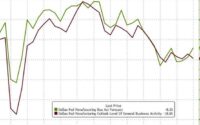The Debt Matters Again – The New York Times
The federal debt starts the new year at a level that is hard to grasp: $34 trillion. That is 1.2 times the U.S.’s annual economic output. At the end of World War II, the ratio was only about 1.1.
Both parties have contributed to the situation. Republicans have passed large tax cuts. Democrats have enacted ambitious climate and health care initiatives. Both funneled money to Americans in response to the Covid pandemic.
For years, many economists believed the country’s debt was not a problem. Interest rates were low, which held down debt payments. Inflation was also low, which suggested the debt wasn’t hampering the economy. If anything, additional government spending helped create jobs when unemployment was elevated for much of the 2010s.
But times have changed, and federal deficits now look scarier.
In November, the financial firm Moody’s lowered its outlook on U.S. debt from “stable” to “negative.” Treasury Secretary Janet Yellen said that she disagreed with Moody’s decision, but she acknowledged that current economic circumstances could make the federal debt less sustainable. And Paul Krugman, the economist and Times columnist, wrote, “Serious deficit reduction, a bad idea a decade ago, is a good idea now.”
Today’s newsletter will help you think about the new economics of debt.
A different situation
There are three big reasons to worry about the federal government’s finances.
First, interest rates have risen. A decade ago, the interest rate that the U.S. paid on inflation-protected bonds, which are used to finance debt, was near zero. Today, that rate is almost 2 percent.
This increase doesn’t change the cost of debt that the government has already accumulated. But it will have to pay more interest on future debt. So if the government does not hold down spending, debt payments will increasingly eat up money that could go to health care, the military and other programs.
Second, the unemployment rate has fallen to 3.7 percent. In the early 2010s, it was usually above 8 percent. Back then, government spending helped put people to work. Today, the private sector needs less help.
Third, inflation is a bigger problem than it used to be, and higher deficits could make it worse. When Congress spends more or cuts taxes, Americans have more money to spend. As they spend that extra cash, prices tend to increase. The reverse is true as well: A smaller deficit can ease inflation.
All of which means that the benefits of deficit spending are smaller than they were in the recent past and the costs are larger.
Risk of delay
Both parties have offered partial solutions to the growing debt. Democrats favor higher taxes on the rich, and Republicans favor cuts to Medicaid and some other federal programs. But each party has mostly blocked the other’s proposals, allowing deficits to add to the debt year after year.
Even if the preferred policies of each party eventually are enacted, they do not come close to solving the problem. Neither party is willing to cut the biggest government programs: Social Security, Medicare and the military. And both have ruled out tax increases on most households.
This dynamic — politicians criticizing deficits without offering a real solution — is not new. The shifting economic circumstances, however, could make the gridlock more damaging.
There is also a risk to procrastination: The longer the government puts off the issue, the harder it gets to solve. By acting sooner, officials could phase in higher taxes and lower spending over years to mitigate the downsides. Some experts argue that the country is already past that point. “We put off solutions for too long, and now we’ll have to take more drastic action,” Maya MacGuineas, the president of the Committee for a Responsible Federal Budget, told me.
The solution remains unclear. And the economy may be able to continue growing at a steady clip for years despite the debt. At some point, though, the federal government will likely need to raise taxes and cut spending in ways that many Americans will find unpleasant.
Related: “The Daily” explained why any political party will find it tough to tackle the federal debt. “The ideas that smart people have on the table are at best Hail Marys,” Jim Tankersley, an economic policy correspondent, said.
THE LATEST NEWS
Israeli Supreme Court
-
Israel’s Supreme Court struck down a divisive law passed by Benjamin Netanyahu’s right-wing government to limit the judges’ powers.
-
The law’s passage last year sparked nationwide protests. This ruling threatens to again divide the country while it fights a war.
-
Read what the justices said in their landmark ruling.
Israel-Hamas War
Other Big Stories
Opinions
As people watch the Israel-Hamas war unfold, they describe being empathetic to the point of exhaustion. What they’re actually feeling is helpless, Adam Grant writes.
Ruti Munder, a woman Hamas held hostage, will never return to Gaza, or have peace with Gazans, while Hamas remains in power.
They do: Read about a young couple married in a Russian prison.
Money: Now may be the time to lock in high interest rates on your savings.
A national institution: How a super-affordable bakery chain became a British culinary icon.
Lives Lived: Les McCann was a pianist and vocalist who was an early progenitor of the bluesy, crowd-pleasing style that came to be known as soul jazz. He died at 88.
SPORTS
College football: Washington beat Texas, 37-31, to advance to the national championship game. Michael Penix Jr. was magnificent.
Rose Bowl: Michigan edged Alabama in overtime, 27-20, and will face Washington in the championship.
Wander Franco: The Rays’ star shortstop was detained in the Dominican Republic in connection with allegations of inappropriate relationships with minors.
ARTS AND IDEAS
The year in space: 2023 was an important year for space travel: India landed a robot on the moon and NASA brought pieces of an asteroid back to Earth to study. But 2024 has a packed calendar of celestial events, too.
The big spectacle will be the “Great North American Eclipse.” On April 8, the moon will get in the way of the sun, darkening the Earth during daytime. And four missions — perhaps more — will try to complete a lunar landing. Read more about the upcoming space calendar.
More on culture
-
Peter Magubane, a photographer who documented the cruelties of white South African rule and endured beatings and 586 consecutive days in solitary confinement, died at 91.
-
Many people think they can’t afford to become a parent. The Cut outlines the short list of things you actually need.
THE MORNING RECOMMENDS …
[ad_2]
Source link


